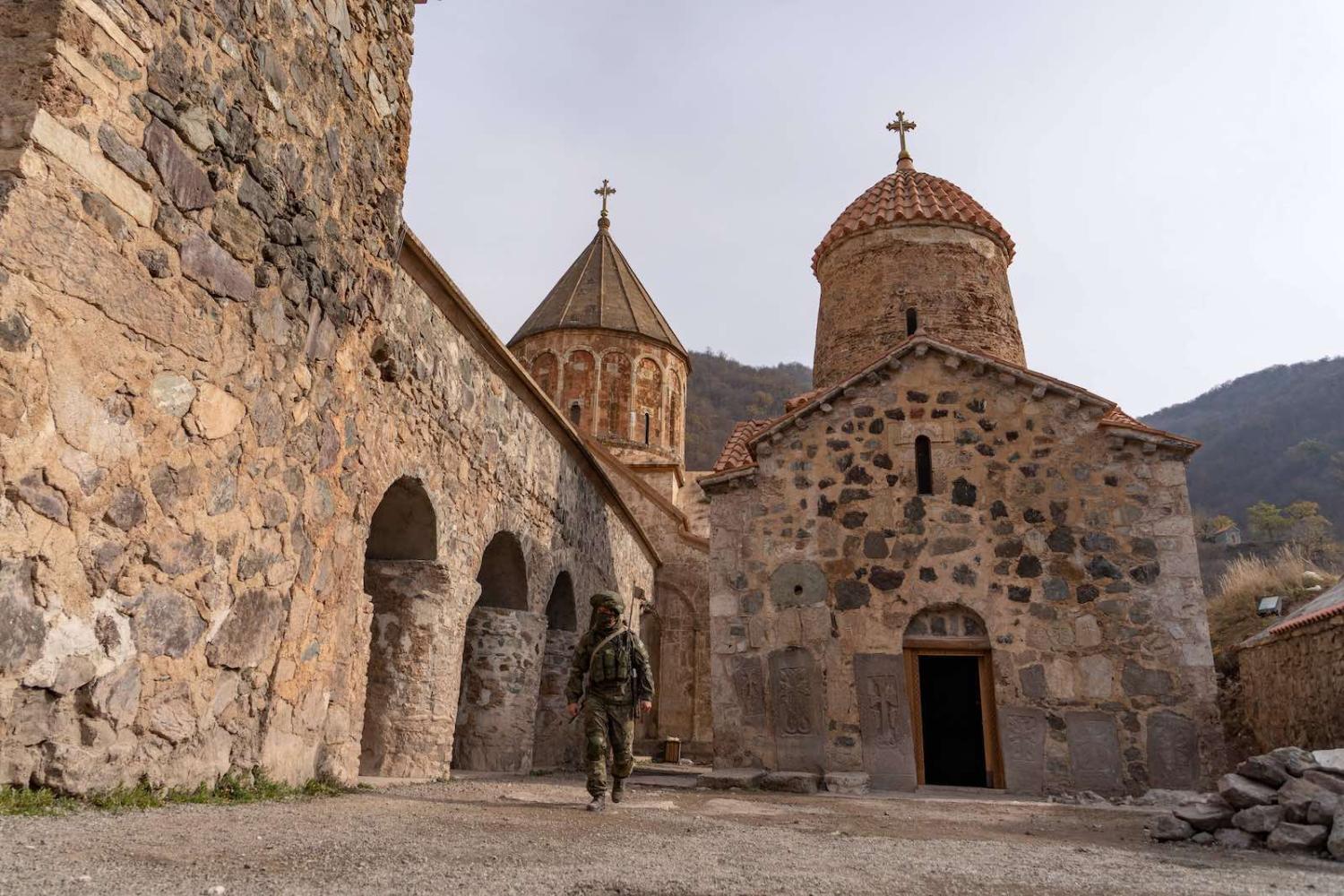Six weeks of renewed fighting between Azerbaijan and Armenia over the disputed territory of Nagorno-Karabakh ended last week after Russia brokered a trilateral agreement with the warring parties. Baku is trumpeting its victory on the field of battle and at the negotiating table, while Yerevan is mired in anger and bitter recriminations. How enduring will the peace agreement be?
Facing defeat by superior Azerbaijani military forces, Armenia had little option but to accept a negotiated settlement. The agreement obliges Armenia to withdraw from all Azerbaijani territories surrounding Nagorno-Karabakh it has occupied since 1994. A 2000-strong contingent of Russian troops has already been deployed to police the line of contact between the warring parties in Nagorno-Karabakh, and to patrol the Lachin transit corridor linking the territory with Armenia.
The agreement may have ended the conflict for now. But it is unlikely to usher in lasting peace.
Why?
Because the sketchy nine-point accord leaves the underlying issues unresolved, not least the long-term status of Nagorno-Karabakh itself. And this is crucial: the visceral emotions aroused by Nagorno-Karabakh for both Armenians and Azerbaijanis underlies their bitter enmity and explains the intractability of the conflict.
Russia’s lead role in implementing the agreement on the ground means it is left carrying the can.
So while obliged for now to swallow a bitter pill, Armenia will see this very much as unfinished business. Anger and humiliation at their defeat can only reinforce aggrieved Armenian nationalist sentiment, already a powerful driver harking back to the 1915 massacres of Armenians by Turkey. Armenians will feel abandoned too by Russia for its conspicuous lack of support (although Moscow contends its treaty commitment to Armenia’s security does not extend to Nagorno-Karabakh, as disputed territory) – in stark contrast to Turkey’s strong backing for Azerbaijan.
Just as Azerbaijan’s loss of Nagorno-Karabakh and its surrounding districts after the 1994 ceasefire fired its burning resentment and resolve over the next quarter century to recover its lands, so too now an embittered Armenia will no doubt be waiting for an opportunity to turn the tables on Azerbaijan.
Hardly, then, a recipe for enduring regional stability.
As for external players, both Russia and Turkey have made gains from the latest conflict, while Western powers have been sidelined. This has some wider geopolitical significance, given the importance of the South Caucasus as a crossroads between Europe, Asia and the Middle East.
The outcome extends Turkey’s role and influence in the region. Ankara’s strong political support and military assistance for Azerbaijan was crucial, tipping the scales in the conflict. Turkey may yet play a role on the ground in enforcing the Moscow agreement, although Russia seems determined to limit this to an observer capacity. Importantly too, agreement to establish a transport corridor between the Azerbaijani exclave of Nakhchivan and the rest of Azerbaijan will give Turkey direct access through to the Caspian Sea and trade routes beyond.

Russia’s role in brokering the deal, and its guaranteed military presence on the ground for at least the next five years in supervising implementation of the agreement, enhances its leverage and influence over Yerevan and Baku. And Moscow has been able to place some check on Turkey’s growing influence in the region. Russia’s relations with Armenia will have been damaged, but the Kremlin will lose no sleep over the fate of Prime Minister Nikol Pashinyan’s embattled democratic government. Moscow will calculate too – probably correctly – that ultimately Armenia has no alternative to Russia, given Yerevan’s enmity with both Ankara and Baku, and continued economic and military dependence on Russia.
Yet Russia’s lead role in implementing the agreement on the ground means it is left carrying the can: Russia is now responsible for limiting any resumption of fighting and providing safe conditions for the orderly return of displaced civilians, which carries potential risks for Moscow in its relations with both Baku and Yerevan.
By contrast, Western states have been relatively disengaged, notably France and the US, the co-guarantors (with Russia) of the Organisation for Security and Co-operation in Europe “Minsk process” set up in 1994 to negotiate a settlement in Nagorno-Karabakh. This has helped Moscow and Ankara extend their influence in the region – and raises a question mark over whether the OSCE Minsk process has any future role to play. Yet, at some point, while determined to preserve its leading role, Moscow may not be averse to multilateralising some of the responsibility – and risks – inherent in the challenging task of keeping the peace between implacably hostile Azeris and Armenians in Nagorno-Karabakh.
Looking ahead, a key issue will be whether and how Russia and Turkey can manage their relations in the South Caucasus. The two powers have already found themselves on opposing sides in Syria and Libya, yet Vladimir Putin and Recep Tayyip Erdoğan have managed to maintain a functional working relationship. Rivalry and competing interests in the South Caucasus will, though, likely provide another point of potential friction.
Peace for now, then, in the South Caucasus, but little prospect of lasting stability.

